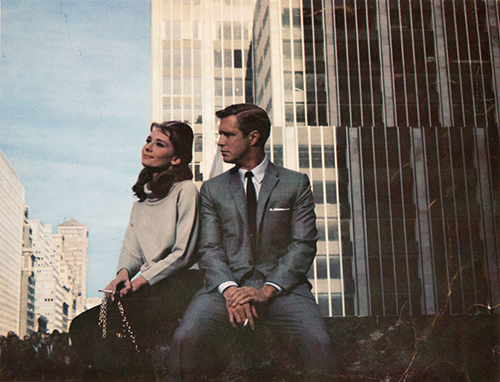Breakfast at Tiffany's the book shares a lot of the same traits as
Breakfast at Tiffany's the film: charming in places, predictable in others, with some questionable and unnecessary ethnic and racist slurs. Truman Capote wrote it in 1958, but the story is set in 1943 as a young, unnamed writer (Capote's stand-in) moves into a brownstone on the upper east side of Manhattan. He soon encounters his 19 year-old enigmatic neighbor, Holly Golightly. She proceeds to charm and repel him at intervals, while remaining oblivious to his roller coaster-like reactions to her.
Holly (Audrey Hepburn) and Paul (George Peppard) spend a day in Manhattan in Breakfast At Tiffany's
Holly is definitely the most interesting character in the story, although she ultimately remains a cipher. What makes the book truly delightful is Capote's way with words. His descriptions of Holly and her antics are a joy to read, even if his humble narrator doesn't seem to ever really grasp her true character or what motivates her.
She was still hugging the cat. "Poor slob," she said, tickling his head, "Poor slob without a name. It's a little inconvenient, his not having a name. But I haven't any right to give him one: he'll have to wait until he belongs to somebody. We just sort of took up by the river one day, we don't belong to each other: he's an independent, and so am I. I don't want to own anything until I know I've found the place where me and things belong together. I'm not quite sure where that is just yet. But I know what it's like." She smiled, and let the cat drop to the floor. "It's like Tiffany's . . . nothing very bad could happen to you there, not with those kind men in their nice suits, and that lovely smell of silver and alligator wallets. If I could find a real-life place that made me feel like Tiffany's, then I'd buy some furniture and give the cat a name.”
Breakfast At Tiffany's, by Truman Capote
As fun and quick a read as it is,
Breakfast at Tiffany's shows a dark side of New York, whether that was Capote's intention or not. Holly has been around - since a very young age. She may be mature beyond her years, but she is still a teenager who is being fawned over by a series of much older men, the narrator included. All these men want something from Holly - to love her, sleep with her, tame her. But she manages to evade their grasp. A young woman living independently, on her own terms, in 1940s New York was an anomaly. Holly as a character makes for interesting reading, but in the end Capote has her leave New York, leave the country, with no explanation, no resolution. Maybe he just didn't know how to deal with such a free spirit. She eluded him, too.
This post also appears on
Cannonball Read 11



0 comments:
Post a Comment